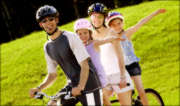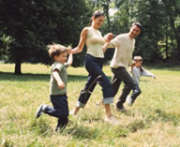Energy Expenditure
Having Slim and Attractive
Body is just a Click away!
Energy Expenditure Chart
For every physical
activity, the body requires energy and the amount depends on the duration
and type of activity.
Energy is measured in
calories and is obtained from the body stores or the food we eat.
This page looks at the
energy expenditure for walking and running.
Walking
Walking is the major type of physical activity. A linear
relationship exists at walking speeds of 3 to 5 km/hr and oxygen uptake but at
faster speeds oxygen consumption rises making walking less economical.
Body mass can predict
energy expenditure with reasonable accuracy at walking speeds of 2 to
4 mph (3.2 to 6.4 km/hr).
The following table
provides the amount of calories you will burn per minute for ranges of
body mass (weight) and speed when you walk on a firm level surface (road,
track or grass).
|
Speed |
Body Mass |
|
Kg |
36 |
45 |
54 |
64 |
73 |
82 |
91 |
|
mph |
km/hr |
Lb |
80 |
100 |
120 |
140 |
160 |
180 |
200 |
|
2.0 |
3.22 |
|
1.9 |
2.2 |
2.6 |
2.9 |
3.2 |
3.5 |
3.8 |
|
2.5 |
4.02 |
|
2.3 |
2.7 |
3.1 |
3.5 |
3.8 |
4.2 |
4.5 |
|
3.0 |
4.83 |
|
2.7 |
3.1 |
3.6 |
4.0 |
4.4 |
4.8 |
5.3 |
|
3.5 |
5.63 |
|
3.1 |
3.6 |
4.2 |
4.6 |
5.0 |
5.4 |
61 |
|
4.0 |
6.44 |
|
3.5 |
4.1 |
4.7 |
5.2 |
5.8 |
6.4 |
7.0 |
If your body mass is 64 kg
and you walk at a speed of 5.63 km/hr then you will burn approximately 4.6
Calories/minute =>
If you walk for one hour you
will burn 60 × 4.6 = 276 Calories.
Running
When running at identical
speeds, a trained distance runner runs at a lower percentage of aerobic
capacity than an untrained athlete does, even though the oxygen uptake
during the run will be similar for both athletes. The demarcation between
running and jogging depends on the individual's level of fitness.
Independent of fitness it
becomes far more economical from an energy viewpoint to change from
walking to running when your speed exceeds 8km/hr (5 mph). Above 8km/hr
the oxygen intake for a walker exceeds the oxygen intake of a runner. At
10km the walker's oxygen (O2) uptake is 40 ml/kg/min compared to 35
ml/kg/min for the runner.
Body mass can predict energy expenditure with reasonable accuracy
when running on a firm level surface (road, track or grass). The amount of calories
required to run 1 km equals your weight in kg - a runner of 78 kg will burn 78
Calories/km. This amounts to 15.6 liters of oxygen (O2) consumed per
kilometer (1 liter of O2 = 5 Calories)
The following table provides the amount of calories you will burn
per minute for ranges of body mass (weight) and speed when you run on a firm
level surface (road, track or grass).
|
Speed |
Body Mass
(Kg) |
|
km/hr |
55 |
65 |
75 |
85 |
95 |
|
8 |
7.1 |
8.3 |
9.4 |
10.7 |
11.8 |
|
9 |
8.1 |
9.8 |
11.0 |
12.6 |
14.4 |
|
10 |
9.1 |
10.8 |
12.2 |
13.6 |
15.3 |
|
11 |
10.2 |
11.8 |
13.1 |
14.7 |
16.6 |
|
12 |
11.2 |
12.8 |
14.1 |
15.6 |
17.6 |
|
13 |
12.1 |
13.8 |
15.0 |
17.0 |
18.9 |
|
14 |
13.3 |
15.0 |
16.1 |
17.9 |
19.9 |
|
15 |
14.3 |
15.9 |
17.0 |
18.8 |
20.8 |
|
16 |
15.4 |
17.0 |
18.1 |
19.9 |
21.9 |
How Exercises Compare
The following table contains the approximate caloric expenditure
in a 30 minute period of exercise for a person weighing 68kg for various
exercises and intensity of work.
|
Exercise |
Intensity |
Calories/½ hour |
|
Aerobics |
Light |
120 |
|
Moderate |
200 |
|
Vigorous |
300 |
|
Walking |
4 km/hr |
105 |
|
7 km/hr |
200 |
|
10 km/hr |
370 |
|
Running |
9 km/hr |
320 |
|
10 km/hr |
350 |
|
12 km/hr |
430 |
|
16 km/hr |
550 |
|
Cycling |
9 km/hr |
120 |
|
16 km/hr |
220 |
|
21 km/hr |
320 |
|
Swimming |
25 meters/min |
165 |
|
40 meters/min |
240 |
|
50 meters/min |
345 |
|
Rowing |
Light |
200 |
|
Vigorous |
420 |
Add 10% for every 7kg over 68kg and deduct 10% for every 7kg
under 68kg
What You are Waiting For? All You Have To Lose Is Your Weight!
And See How Much You Gain ...



 Through our Family Fitness programs, parents and children discover that
exercising together is a great way to have fun and share quality time while
reaping the benefits of better health and increased vitality.
Through our Family Fitness programs, parents and children discover that
exercising together is a great way to have fun and share quality time while
reaping the benefits of better health and increased vitality.
 And Family Fitness doesn�t stop at exercise - we can also help with diet and nutrition, relaxation
techniques, stress busting and time management strategies.... all aimed all
helping the whole family get the most out of life!
And Family Fitness doesn�t stop at exercise - we can also help with diet and nutrition, relaxation
techniques, stress busting and time management strategies.... all aimed all
helping the whole family get the most out of life!
 Getting families fit and helping them to enjoy the benefits of a healthier lifestyle is something we at Walk Tall take pride in.
Getting families fit and helping them to enjoy the benefits of a healthier lifestyle is something we at Walk Tall take pride in.
 We love to see the changes parents and children experience as a result of including exercise in their lives: increased energy, improved sleep, better concentration, fewer aches and pains, less stress, and a happier outlook being just a few of the more common benefits.
We love to see the changes parents and children experience as a result of including exercise in their lives: increased energy, improved sleep, better concentration, fewer aches and pains, less stress, and a happier outlook being just a few of the more common benefits.
